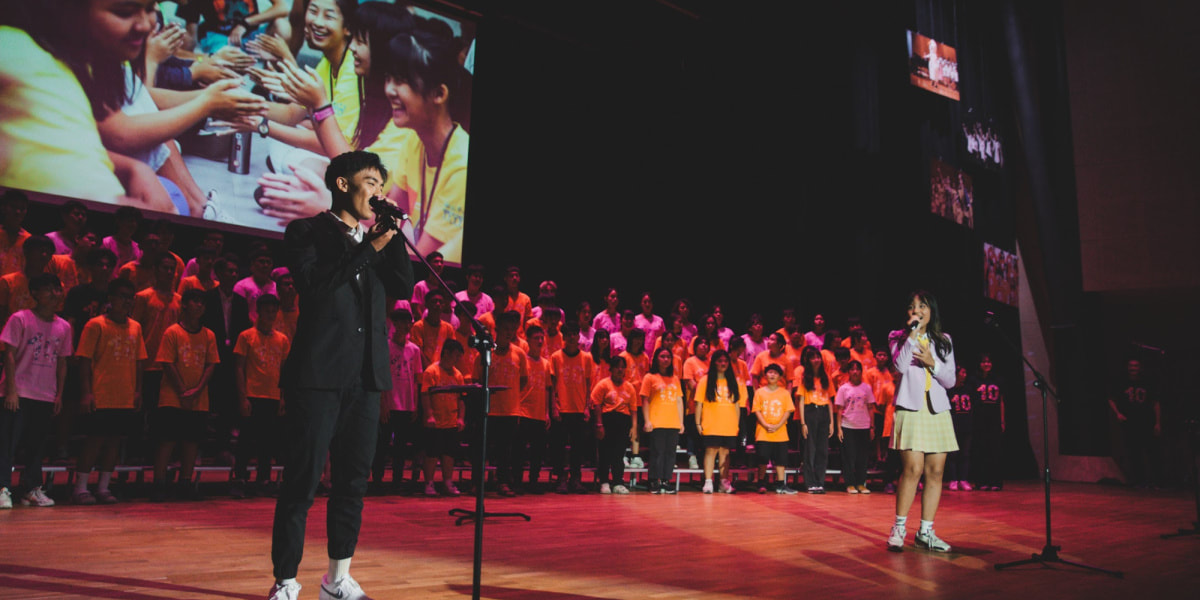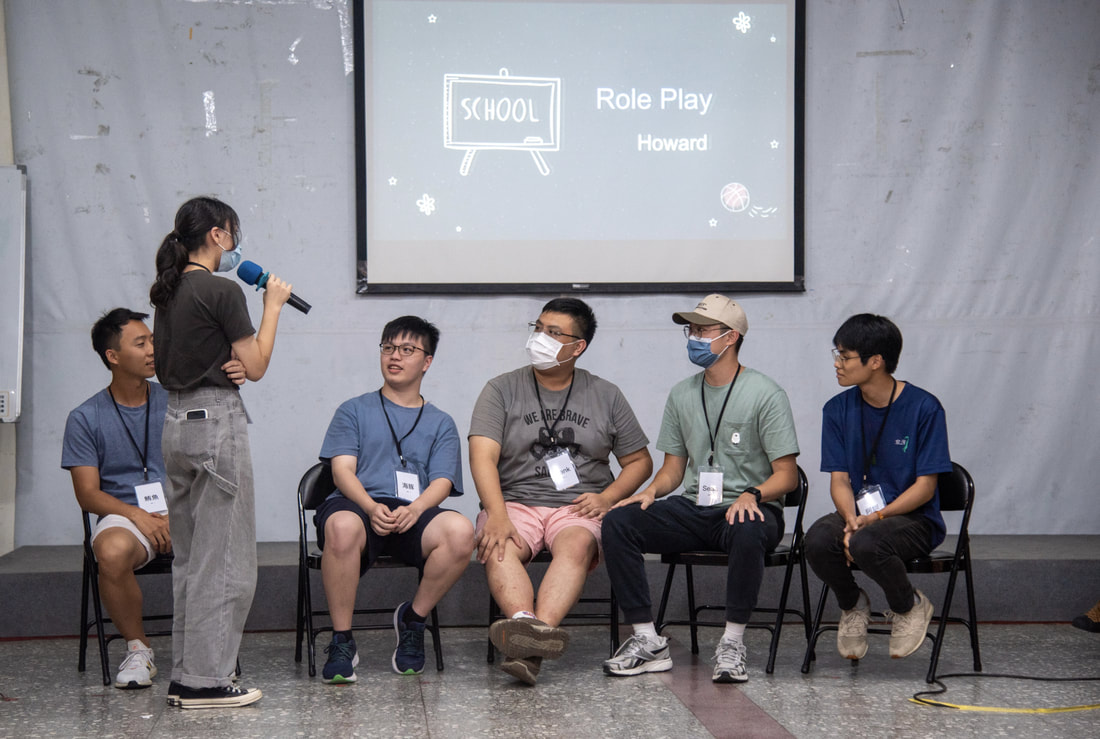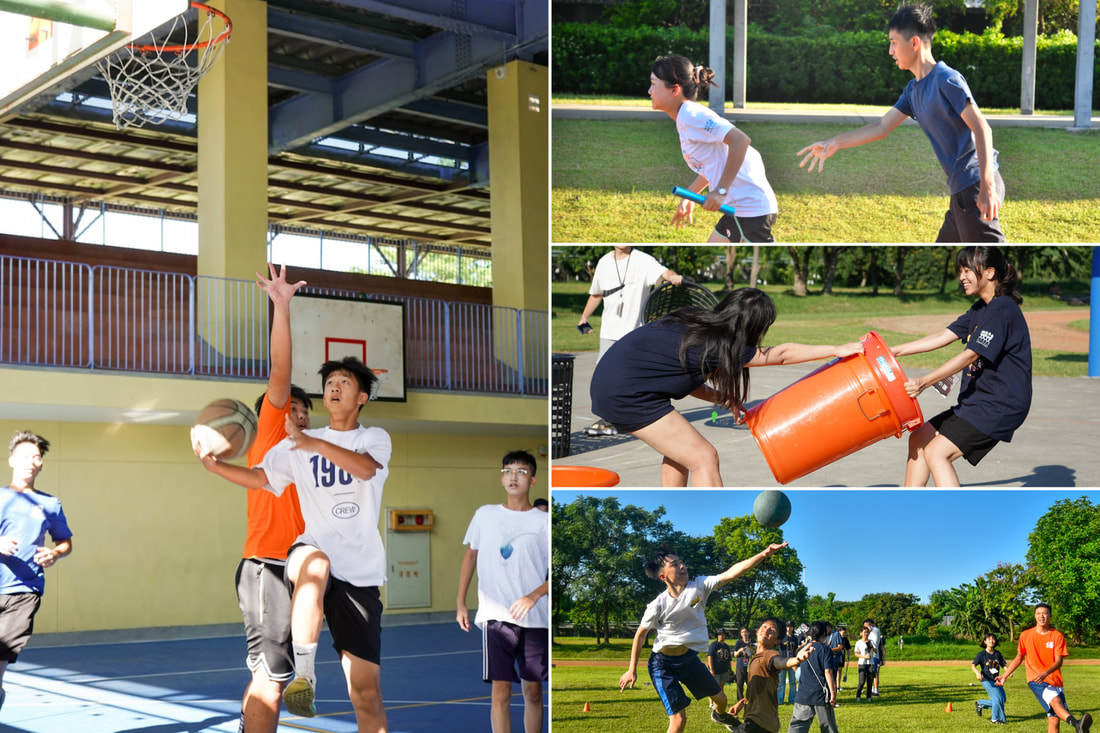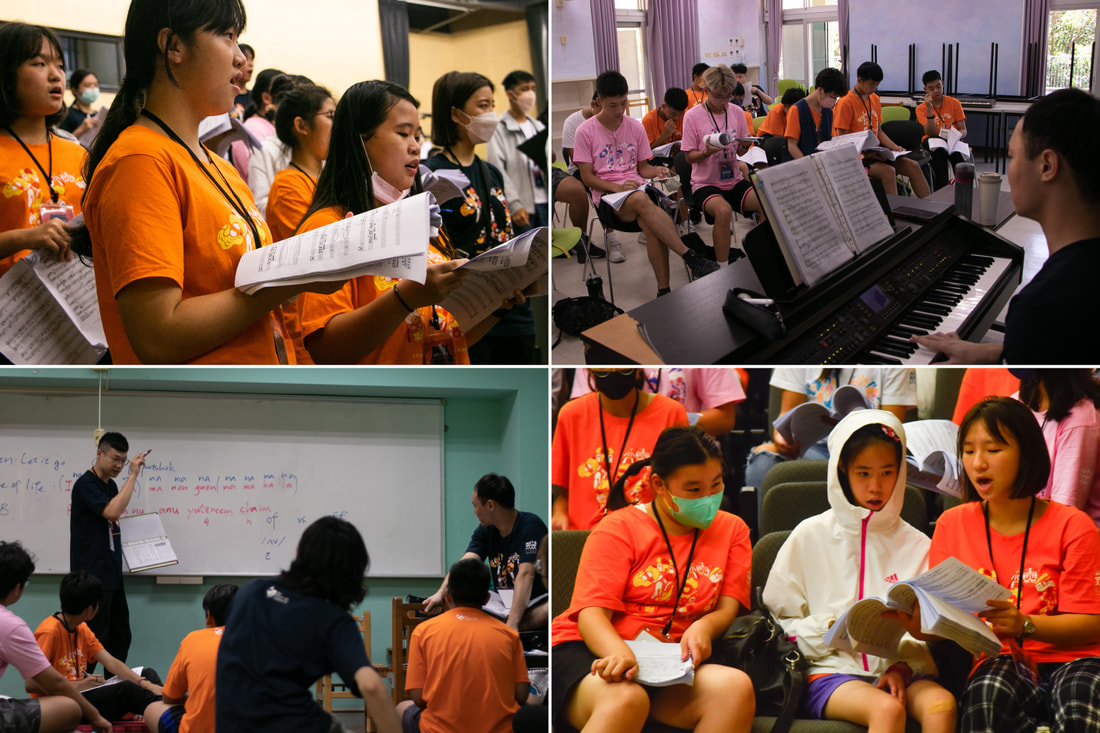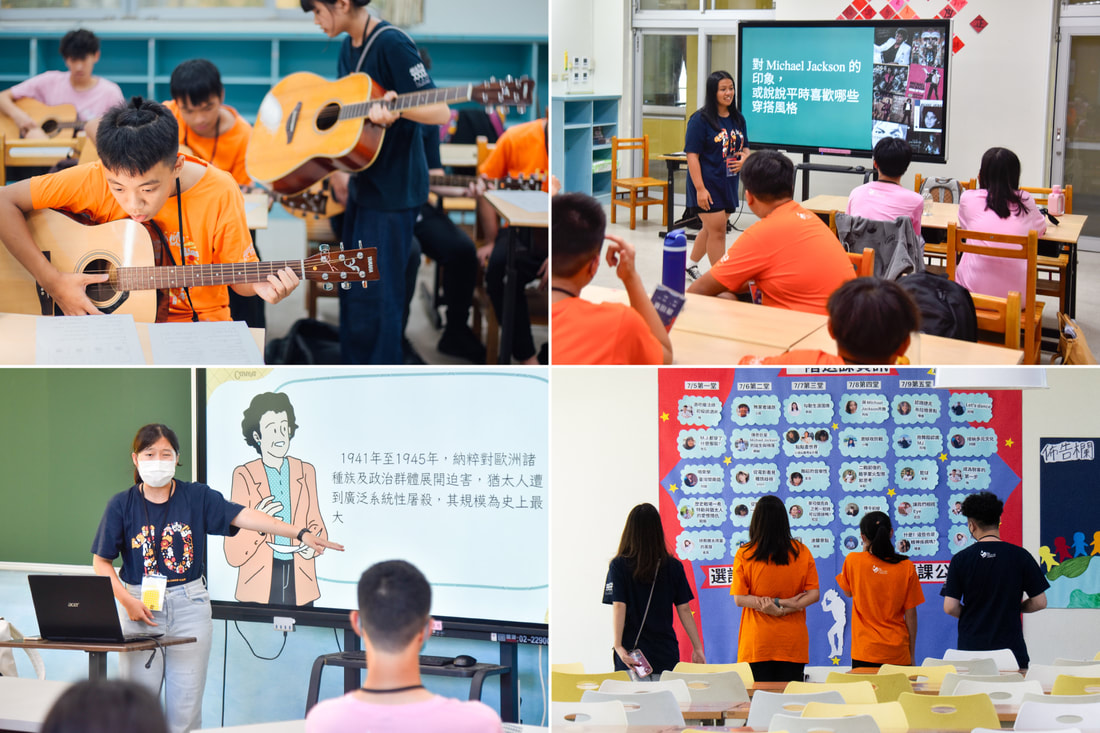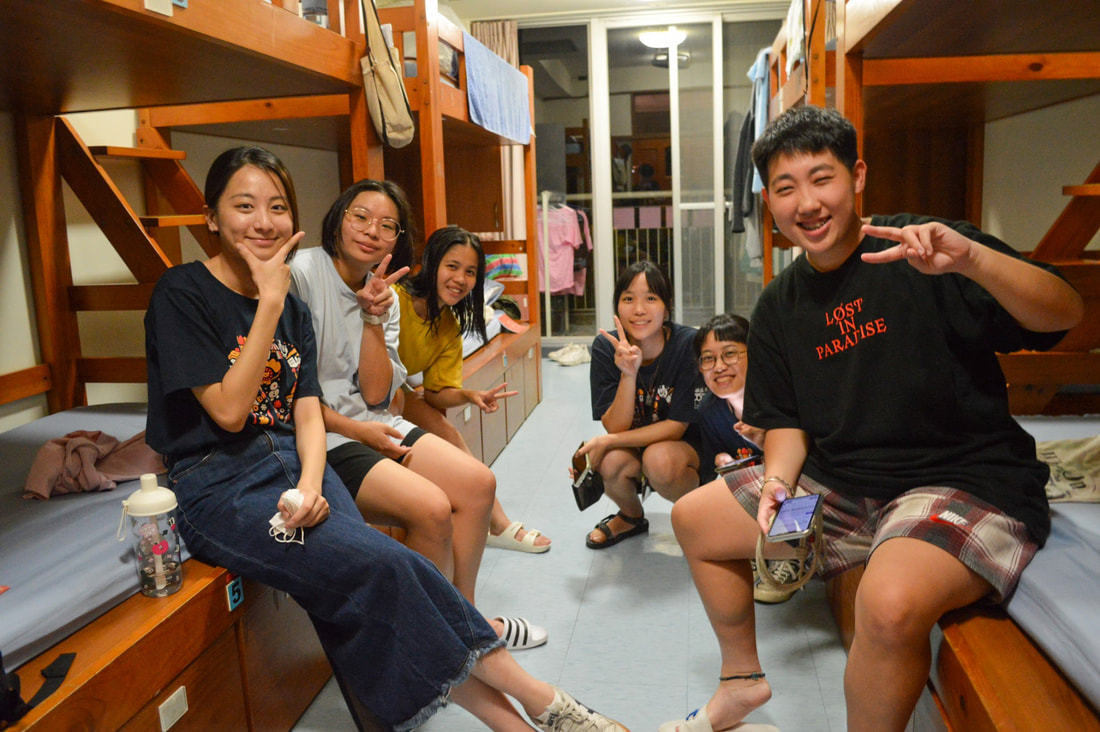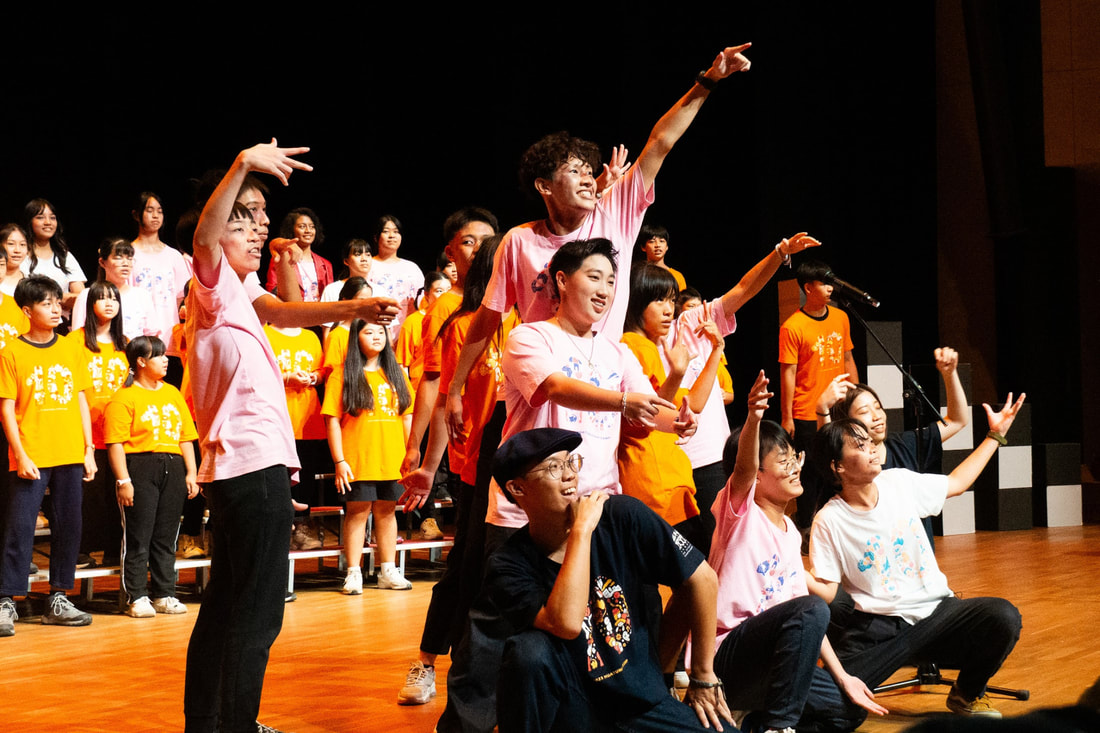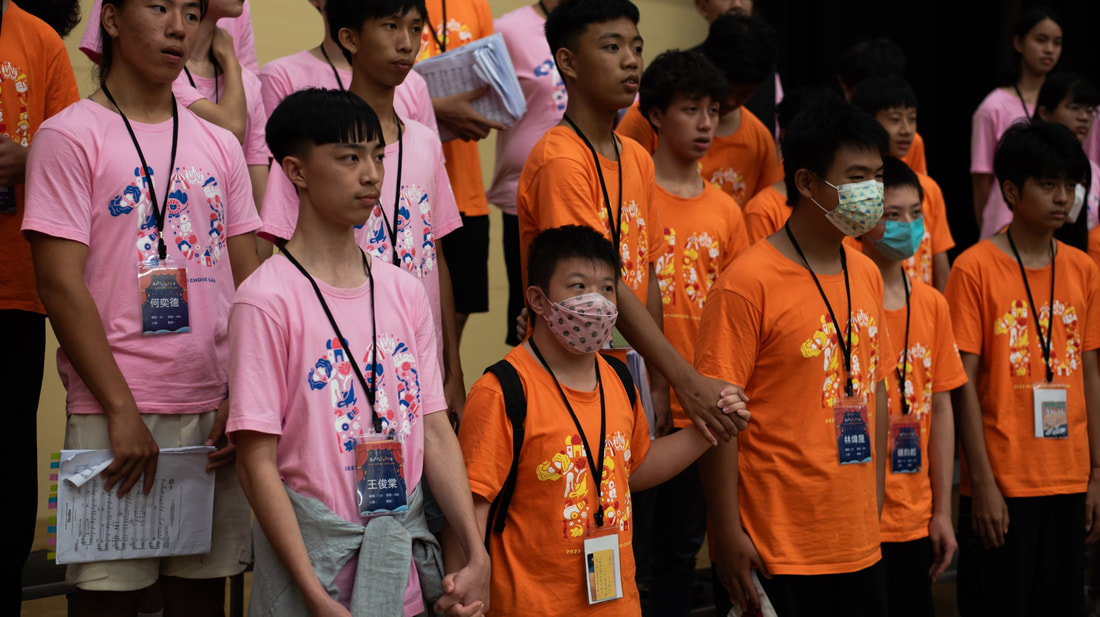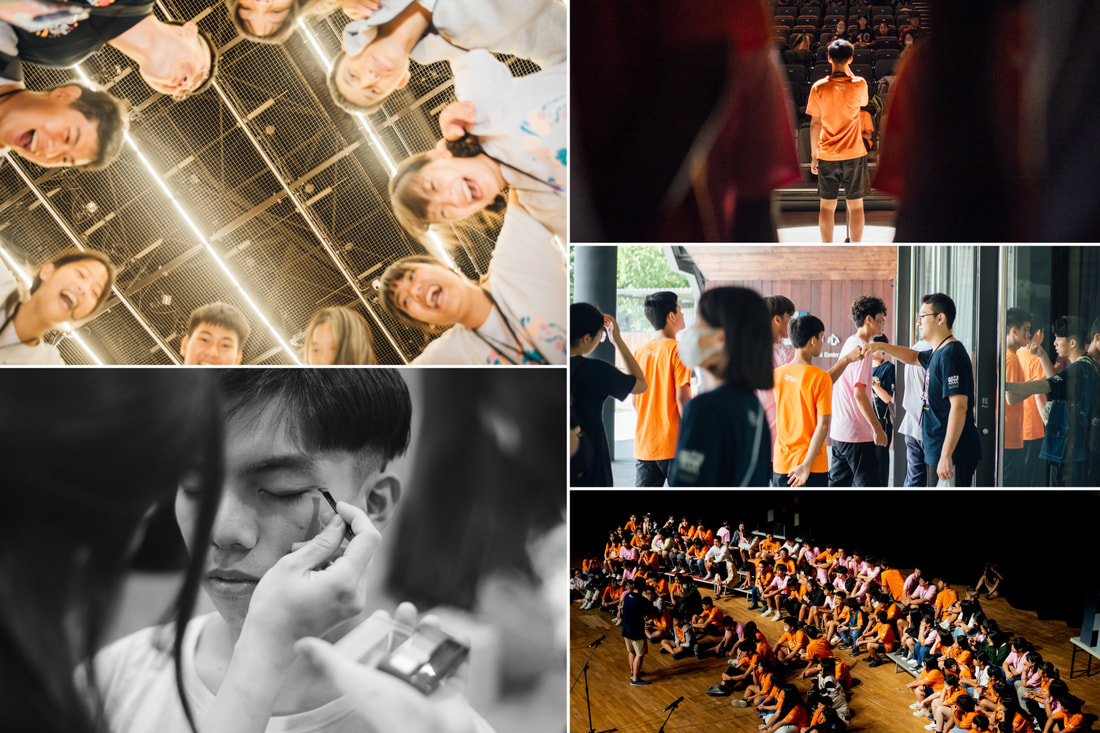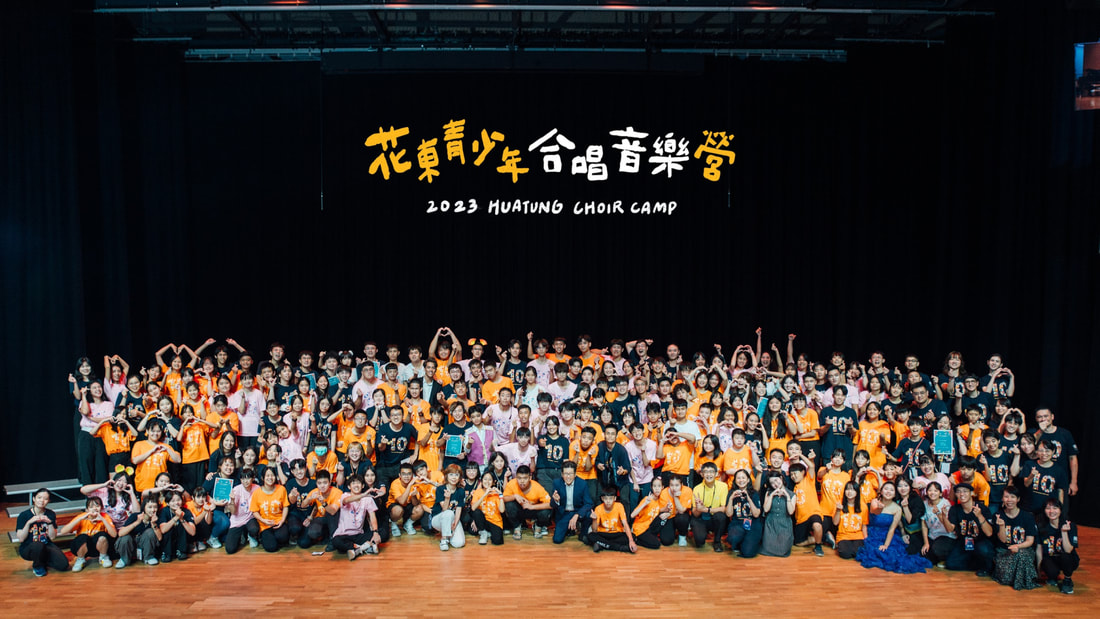Huatung Choir Camp’s 10th Year
“When you sing well on stage, we will applaud you, and if you forget your lyrics, we will give you an even greater applause!” - Huatung Choir Camp
Huatung Choir Camp is now in its tenth year. Chair Stanley Yen shared his support for hosting the summer camp, "During the summer holidays, Junyi School of Innovation’s dormitories are empty. By organizing the camp at the school, students from different backgrounds can come here, engage in a few days of interaction and genuine communication with others, learn to care for the world, and experience more diverse aspects of 'being' and 'living.'"
The camp's participants do not need exceptional singing skills; they only need to have a passion for singing. Through choral activities, themed courses, and camp life, they make friends from different backgrounds. After the camp ends, many participants and volunteers eagerly look forward to returning the following year. The camp has a certain magic, with an 80% return rate for this year's volunteers, and participants learn a year's worth of life education in just 13 days.
Huatung Choir Camp is now in its tenth year. Chair Stanley Yen shared his support for hosting the summer camp, "During the summer holidays, Junyi School of Innovation’s dormitories are empty. By organizing the camp at the school, students from different backgrounds can come here, engage in a few days of interaction and genuine communication with others, learn to care for the world, and experience more diverse aspects of 'being' and 'living.'"
The camp's participants do not need exceptional singing skills; they only need to have a passion for singing. Through choral activities, themed courses, and camp life, they make friends from different backgrounds. After the camp ends, many participants and volunteers eagerly look forward to returning the following year. The camp has a certain magic, with an 80% return rate for this year's volunteers, and participants learn a year's worth of life education in just 13 days.
Not all are born equal, but everyone has the ability to surpass themselves
On the day before the arrival of 96 high school participants, the instructors asked 43 volunteers to stand side by side and asked a series of questions, "Step forward if you don't have student loans," "Step forward if you've been abroad," "Step forward if both your parents are still alive," and so on. After a few rounds of questioning, everyone was asked to turn around and see that some volunteers were still standing in the same place. This visualization of the concept that "not all are born equal" led to the realization that some individuals' advantages may not necessarily be the result of their own efforts, but everyone can surpass themselves by utilizing their talents and learning from experience.
They then further discussed the power of empathy, "As volunteers, we need to understand that each student has different background experiences. After spending time with them, you will understand where they come from and engage with them with greater enthusiasm."
In the four months leading up to the camp, with an average of two days of training each month, senior volunteers also used ACF’s "The Listener" series to remind new volunteers that before helping others, they must first be a “listener” to themselves, understand their own emotions, and learn to deal with their own stress. The role-play which followed, which received extensive feedback from volunteers, was the most effective in helping them learn to handle difficulties. Instructors set up various scenarios for volunteers to role-play, such as shy newcomers who cannot fit in, participants carrying prohibited items, or the boundaries of interactions between participants and volunteers. Some volunteers would speak only after thinking, while others would lose their rationality when emotions took over. After the role-play, everyone discussed how to respond to these situations. Because they had played the role of those involved, volunteers were better able to empathize with participants when facing real situations.
On the day before the arrival of 96 high school participants, the instructors asked 43 volunteers to stand side by side and asked a series of questions, "Step forward if you don't have student loans," "Step forward if you've been abroad," "Step forward if both your parents are still alive," and so on. After a few rounds of questioning, everyone was asked to turn around and see that some volunteers were still standing in the same place. This visualization of the concept that "not all are born equal" led to the realization that some individuals' advantages may not necessarily be the result of their own efforts, but everyone can surpass themselves by utilizing their talents and learning from experience.
They then further discussed the power of empathy, "As volunteers, we need to understand that each student has different background experiences. After spending time with them, you will understand where they come from and engage with them with greater enthusiasm."
In the four months leading up to the camp, with an average of two days of training each month, senior volunteers also used ACF’s "The Listener" series to remind new volunteers that before helping others, they must first be a “listener” to themselves, understand their own emotions, and learn to deal with their own stress. The role-play which followed, which received extensive feedback from volunteers, was the most effective in helping them learn to handle difficulties. Instructors set up various scenarios for volunteers to role-play, such as shy newcomers who cannot fit in, participants carrying prohibited items, or the boundaries of interactions between participants and volunteers. Some volunteers would speak only after thinking, while others would lose their rationality when emotions took over. After the role-play, everyone discussed how to respond to these situations. Because they had played the role of those involved, volunteers were better able to empathize with participants when facing real situations.
The camp consists of high school participants, high school Counselors-in-Training (CIT) - young volunteers in training, college volunteers, mentors, camp leaders, instructors, and choir teachers. Behind each member is another group of people playing supporting roles. CITs, in particular, play a crucial role. Before becoming official volunteers, they not only wholeheartedly participate in camp activities but also take on additional responsibilities for caring for participants.
After check-in, participants are divided into four different vocal groups based on their vocal characteristics. In teaching, five instructors take turns, allowing participants to experience different teaching styles. CITs assist participants with slower progress in reading sheet music and improving their concentration. This year, there were 20 English songs, 3 Hebrew songs, and 1 Chinese song. Regardless of their level of English, as none of the participants knew Hebrew, they helped each other by marking pronunciation with phonetic symbols, starting from scratch together toward a common goal.
After check-in, participants are divided into four different vocal groups based on their vocal characteristics. In teaching, five instructors take turns, allowing participants to experience different teaching styles. CITs assist participants with slower progress in reading sheet music and improving their concentration. This year, there were 20 English songs, 3 Hebrew songs, and 1 Chinese song. Regardless of their level of English, as none of the participants knew Hebrew, they helped each other by marking pronunciation with phonetic symbols, starting from scratch together toward a common goal.
"Schindler's List": Discussions on bullying
After choir class, in the afternoon, volunteers organize theme classes and elective courses for the participants. On the blackboard in the classroom, three lines of text display important principles, "Respect the speaker, focus on the issue, present arguments based on facts." The theme class was planned by college volunteers Moon and Titi, who have backgrounds in psychology and special education. They carefully considered the background information of this year's participants and developed five progressive courses. These courses aim to start from bullying issues that teenagers can relate to and guide discussions on topics such as human rights and critical thinking.
After choir class, in the afternoon, volunteers organize theme classes and elective courses for the participants. On the blackboard in the classroom, three lines of text display important principles, "Respect the speaker, focus on the issue, present arguments based on facts." The theme class was planned by college volunteers Moon and Titi, who have backgrounds in psychology and special education. They carefully considered the background information of this year's participants and developed five progressive courses. These courses aim to start from bullying issues that teenagers can relate to and guide discussions on topics such as human rights and critical thinking.
Moon said, "We did not discuss the opposition between the characters in 'Schindler's List' because we were concerned that it would indirectly traumatize the participants. Instead, we approached it from the perspective of the environment." In one of the lessons, they studied a group within the concentration camp known as the "Kapo." Although they were Jewish, they faced a dilemma as they assisted Nazi officers in harming their fellow Jews for self-preservation. They viewed this situation as similar to the role of "enablers" in bullying incidents, who face inner conflicts.
After the 50-minute lesson, there was much feedback from participants. Some said, "Often, we dislike a person because of biases such as gossip and rumors. In the future, I will verify before passing judgment." Others said, "Perhaps the next time I encounter bullying, I can care about the person being bullied and let them know that someone is willing to listen to them." However, some had conflicts due to differing positions. A volunteer said, "We respect everyone's different perspectives and talked to participants from both sides. In the second half of the camp, one of them wrote a card saying he didn't want to oppose others but had just seen a different aspect of the matter." These responses demonstrate that the participants think deeply and diversely.
In addition to "Schindler's List," another theme for 2023 was "Michael Jackson." In today's world, with global pandemics, climate change, the Russia-Ukraine war, and various human rights issues affecting various parts of the world, the cheerful melodies of Michael Jackson's classic songs can harmonize with these heavy matters. The song "We Are The World" tightly bonds everyone's hearts, reminding each student that there is a warm and bright side to humanity.
After the 50-minute lesson, there was much feedback from participants. Some said, "Often, we dislike a person because of biases such as gossip and rumors. In the future, I will verify before passing judgment." Others said, "Perhaps the next time I encounter bullying, I can care about the person being bullied and let them know that someone is willing to listen to them." However, some had conflicts due to differing positions. A volunteer said, "We respect everyone's different perspectives and talked to participants from both sides. In the second half of the camp, one of them wrote a card saying he didn't want to oppose others but had just seen a different aspect of the matter." These responses demonstrate that the participants think deeply and diversely.
In addition to "Schindler's List," another theme for 2023 was "Michael Jackson." In today's world, with global pandemics, climate change, the Russia-Ukraine war, and various human rights issues affecting various parts of the world, the cheerful melodies of Michael Jackson's classic songs can harmonize with these heavy matters. The song "We Are The World" tightly bonds everyone's hearts, reminding each student that there is a warm and bright side to humanity.
Everyone is capable and worthy of love
The choir camp aims to have participants wholeheartedly engage in the activities, experience a break from electronic devices, and return to genuine human interactions. Consequently, the strictest rule for the participants during the 13-day camp is "no mobile phone usage." Some participants may not easily comply, voicing protests like, "This violates human rights!" Additionally, one student was found to have kept his phone and made a secret call home. Instead of reprimanding, the volunteers guided them to discover the enjoyment of the camp, "We understand that you miss your family, but not using a phone is a camp principle that shouldn't be easily broken. There are many exciting activities to look forward to in the coming days!"
Yunung, who served as a volunteer at the choir camp for three years during his university days and later became a choir teacher at the camp, shared, "In the camp, everyone uses very positive language. However, this isn't a façade. It's built on the belief that 'you believe every participant is capable.' They are not unwilling to participate; they may simply not be ready for that particular class." When other activities become available, such as drama, art, or sports, they enthusiastically engage because it is at the core of the music camp's philosophy, "IALAC" (I Am Lovable And Capable)."
From being an individual to becoming a group of us
With a total of 104 participants which include the CIT, the camp breaks up the routine sectional practices, after-school activities, and elective classes, ensuring that everyone has the opportunity to interact with others. A staff member from Junyi School described a situation in the dining hall this way, "The camp seems to seize every opportunity to express gratitude." During lunch every day, participants can write down what they want to say, submit it anonymously, and place the notes in the "Chatting Box." These notes are then recited by volunteers from the counseling team, turning lunchtime into a gratitude-sharing session.
In the evenings, each dormitory has at least two volunteers serving as Buddies. They not only provide a space for participants to share their thoughts but also engage in written communication through journaling. Volunteers assist participants in writing letters and invite their families to attend the choir performance. Through the efforts of the volunteers and the natural interactions among the participants, the choir camp creates a sense of belonging and almost eliminates the presence of outsiders. The camp becomes a home for everyone to express their emotions.
Inclusive education: Connecting through music
Since 2016, the choir camp has been collaborating with social welfare organizations to admit approximately 10 participants with special needs each year. While their behavior or communication abilities may differ from typical participants, music becomes a place where they can fully enjoy themselves. The choir teacher states, "Even if their pitch isn't accurate, when they sing loudly, it signifies great self-confidence and their enjoyment of music. It's a beautiful sight!"
"When you sing well on stage, we will applaud you; if you forget the lyrics on stage, we will applaud you even more!"----is a core message of the camp. Regardless of singing errors, inability to read, or off-key singing, there is no blame. The goal is to provide a happy and safe environment for participants. Even if they forget all the songs when they leave the camp, what they take with them is the confidence that, "I have the ability to do something." So, as long as they are happy here, the purpose of attending the music camp is achieved!
The choir camp aims to have participants wholeheartedly engage in the activities, experience a break from electronic devices, and return to genuine human interactions. Consequently, the strictest rule for the participants during the 13-day camp is "no mobile phone usage." Some participants may not easily comply, voicing protests like, "This violates human rights!" Additionally, one student was found to have kept his phone and made a secret call home. Instead of reprimanding, the volunteers guided them to discover the enjoyment of the camp, "We understand that you miss your family, but not using a phone is a camp principle that shouldn't be easily broken. There are many exciting activities to look forward to in the coming days!"
Yunung, who served as a volunteer at the choir camp for three years during his university days and later became a choir teacher at the camp, shared, "In the camp, everyone uses very positive language. However, this isn't a façade. It's built on the belief that 'you believe every participant is capable.' They are not unwilling to participate; they may simply not be ready for that particular class." When other activities become available, such as drama, art, or sports, they enthusiastically engage because it is at the core of the music camp's philosophy, "IALAC" (I Am Lovable And Capable)."
From being an individual to becoming a group of us
With a total of 104 participants which include the CIT, the camp breaks up the routine sectional practices, after-school activities, and elective classes, ensuring that everyone has the opportunity to interact with others. A staff member from Junyi School described a situation in the dining hall this way, "The camp seems to seize every opportunity to express gratitude." During lunch every day, participants can write down what they want to say, submit it anonymously, and place the notes in the "Chatting Box." These notes are then recited by volunteers from the counseling team, turning lunchtime into a gratitude-sharing session.
In the evenings, each dormitory has at least two volunteers serving as Buddies. They not only provide a space for participants to share their thoughts but also engage in written communication through journaling. Volunteers assist participants in writing letters and invite their families to attend the choir performance. Through the efforts of the volunteers and the natural interactions among the participants, the choir camp creates a sense of belonging and almost eliminates the presence of outsiders. The camp becomes a home for everyone to express their emotions.
Inclusive education: Connecting through music
Since 2016, the choir camp has been collaborating with social welfare organizations to admit approximately 10 participants with special needs each year. While their behavior or communication abilities may differ from typical participants, music becomes a place where they can fully enjoy themselves. The choir teacher states, "Even if their pitch isn't accurate, when they sing loudly, it signifies great self-confidence and their enjoyment of music. It's a beautiful sight!"
"When you sing well on stage, we will applaud you; if you forget the lyrics on stage, we will applaud you even more!"----is a core message of the camp. Regardless of singing errors, inability to read, or off-key singing, there is no blame. The goal is to provide a happy and safe environment for participants. Even if they forget all the songs when they leave the camp, what they take with them is the confidence that, "I have the ability to do something." So, as long as they are happy here, the purpose of attending the music camp is achieved!
“Inclusive education" is widely implemented globally, and Taiwan is also actively promoting it. In the choir camp, it provides a relatively straightforward opportunity for inclusive learning for students with special needs and typical students. This helps typical students understand that caring for others is an essential civic duty. A special education teacher from Kuang Jen High School also shared that the special needs students who participate in the choir camp might be leaving home alone for the first time in their lives. Through interacting with others, the social interaction skills of these special needs students noticeably improve. Camp Director, Green Bean, said, "When I see a typical student holding the hand of a student with special needs, practicing singing together, eating together, my heart is filled with emotion because we simply want to provide them with an opportunity to understand each other and interact fully."
On the last day of the camp, during the two final performances, the special needs students happily moved their bodies while singing. When the emotions ran high, fellow students would gently pat their hands to comfort them. The performance also invited back former soloists, and as their voices filled the venue, the screens displayed their moments from when they attended the camp, as if a time machine had brought back their youthful presence. For the grand finale, special needs students performed sign language. Following this, participants pulled volunteers from the audience onto the stage to sing together. The volunteers were deeply moved, with tears in their eyes, and the guests and parents in the audience were also visibly emotional.
After the closing, all the participants retrieved their phones. However, their first priority was not to connect with the outside world but to take group photos with fellow students, volunteers, and teachers. They also exchanged contact information and embraced each other.
In today's world, many are striving to achieve the United Nations' Sustainable Development Goals (SDGs), and the principle of "leaving no one behind" is a crucial part of it. There are far too many living in vulnerability and insecurity, and the level of civilization depends on how people treat each other. When the Huatung Choir Camp was launched ten years ago by the Harvest 365 and The Alliance Cultural Foundation, they might not have realized that the camp's existence is a step toward the realization of SDGs. It provides a group of companions for every child who has ever felt insecure, offering them a space where they can be heard and accompanied during their youth.
In today's world, many are striving to achieve the United Nations' Sustainable Development Goals (SDGs), and the principle of "leaving no one behind" is a crucial part of it. There are far too many living in vulnerability and insecurity, and the level of civilization depends on how people treat each other. When the Huatung Choir Camp was launched ten years ago by the Harvest 365 and The Alliance Cultural Foundation, they might not have realized that the camp's existence is a step toward the realization of SDGs. It provides a group of companions for every child who has ever felt insecure, offering them a space where they can be heard and accompanied during their youth.

